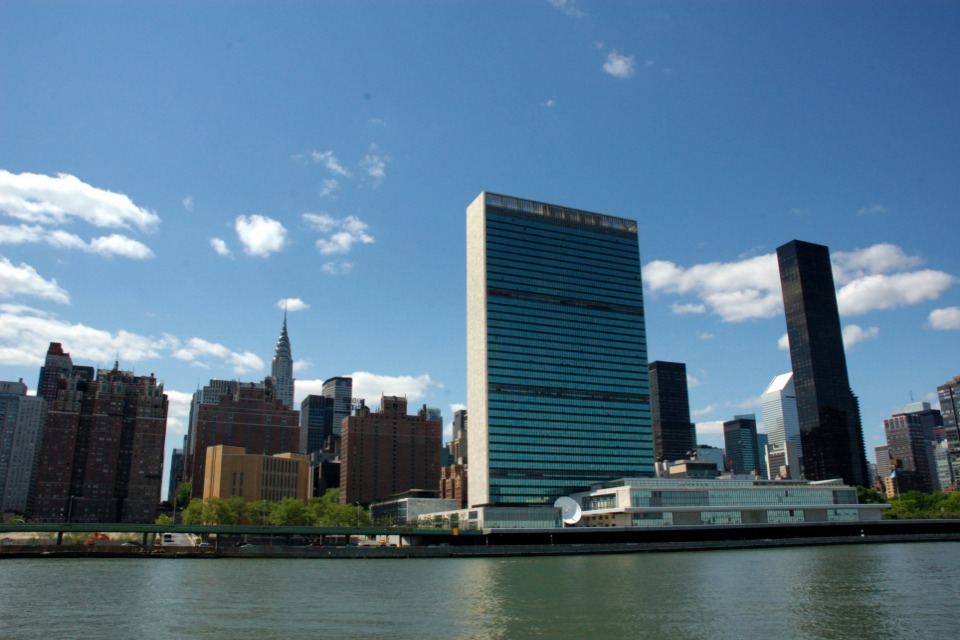"The Security Council has to make very clear where it stands against the profoundly dangerous path that Russia is pursuing in east Ukraine"
Statement by Ambassador Mark Lyall Grant of the UK Mission to the UN, to the Security Council Meeting on Ukraine

Thank you Mr President,
I would like to thank Mr Feltman for his briefing this afternoon.
Mr President,
This weekend we saw the biggest single loss of civilian life in the Ukrainian crisis since the commitments made at Minsk on 5 September last year. Thirty civilians killed, over one hundred wounded, following what the OSCE termed an ‘extremely heavy barrage’ of rockets fired indiscriminately into the crowded streets of Mariupol. Only three days earlier, this Council had met to raise our serious concerns at the escalation in fighting along the agreed ceasefire line. All of us called for de-escalation and a resumption of dialogue. This attack, many kilometres over the agreed ceasefire line, has taken the scope and threat of this conflict to a substantially new level.
This attack was not just another refusal of the separatist leadership to abide by the commitments made at Minsk. It was a provocative and reckless escalation that, as the Secretary-General has made clear, could constitute a violation of international humanitarian law. Those responsible for the attack must be held accountable for their actions. It is deeply regrettable that the Council failed to agree a press statement that would have condemned the announcement of a separatist offensive against Mariupol and the subsequent attack on Mariupol.
No-one in this council can deny the fact that the attack on Mariupol, like last week’s on a bus near Volnovakha, came from the Russian-backed separatists. The OSCE Special Monitoring Mission analysis of both attacks indicates clearly that in both incidents the rockets were fired from separatist-held territory. This attack would not have been possible without the military support of Russia and their supply of multiple launch GRAD and Urugan rocket systems to the separatists.
In the last few weeks, Russia has transferred to the separatists hundreds of additional heavy weapons – not just rocket systems, but also heavy artillery, tanks and armoured vehicles. Hundreds of Russian regular forces and Special Forces continue to operate on Ukrainian territory in clear violation of Ukraine’s sovereignty and territorial integrity. These soldiers are backed by Russian command and control elements, air defence systems, drones and electronic warfare systems.
Mr President,
There is no doubt that the flow of heavy weapons across these borders – in violation of the territorial integrity and sovereignty of Ukraine - has given the separatists the firepower and the confidence to escalate this conflict. And since the Minsk agreements in September, which included an immediate ceasefire, the separatists have taken control of an additional 550 square kilometres of territory.
Despite those commitments made at Minsk to secure continuous monitoring of the border with verification from the OSCE, hundreds of kilometres of border remain free for the flow of these deadly weapons, often under the guise of humanitarian convoys. Russia’s persistent blocking of the proposed expansion of the OSCE border monitoring reveals their true intentions.
Mr President,
Russia arms the separatists, it finances them, it advises them and it fights covertly alongside them. What it has not managed to do is to get its separatist proxies to stick to Russia’s deceitful narrative. Self proclaimed leader of the Donetsk People’s Republic, Aleksandr Zakharchenko, proudly announced on 24 January that: ‘today an offensive was launched on Mariupol. This will be the best possible monument for all of our dead’. This statement, and others like it, cannot be deliberately ignored, as the Russian representative encourages us to do. It is the reality: while Russia professes adherence to the Minsk agreements and the Normandy format meetings, while it accuses the Ukrainian government of provocations, the separatist forces that it supports are bent on undermining those agreements, attacking civilians and creating new realities on the ground.
This approach, as we have seen in Mariupol this weekend, will only lead us closer to the precipice. It will lead to more deaths, more destruction and more people displaced from their homes.
Mr President,
On each occasion that this Council has met to discuss Ukraine, the vast majority of its members underline their commitment to Ukraine’s sovereignty, unity and territorial integrity. We assert, quite rightly, that these are fundamental principles of the United Nations charter. They provide the foundation for an international system that is based on rules and respect, and the preservation of international peace and security. We all defend these principles because we do not want a world where borders are redrawn by force, where states are threatened and destabilised by their neighbours, and where innocent civilian populations live in fear of battle orders issued from far off capitals.
The Security Council has to make very clear where it stands against the profoundly dangerous path that Russia is pursuing in east Ukraine. That is why I urge all Council members to be clear in their messaging today.
Russia must withdraw its equipment and troops, it must cease its support to the separatists and it must effectively control its borders. It must use its influence over the separatists to stabilise the situation and prevent further dangerous escalation. It must play its full part in ensuring the immediate implementation of the Minsk protocol.
Once again today, the representative of the Russian Federation has claimed that his country wants a peaceful resolution to this conflict. But such words are worthless in themselves. We need to see Russian actions to put a stop to this widely and increasingly deadly conflict.
Thank you.